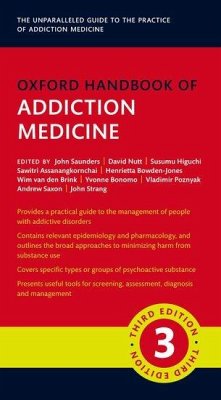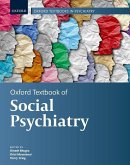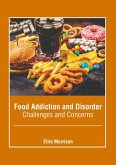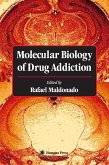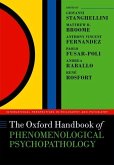John Saunders, John Strang, David Nutt, Susumu Higuchi, Sawitri Assanangkornchai, Henrietta Bowden-Jones, Wim van den Brink, Yvonne Bonomo, Vladimir Poznyak, Andrew Saxon
Oxford Handbook of Addiction Medicine
John Saunders, John Strang, David Nutt, Susumu Higuchi, Sawitri Assanangkornchai, Henrietta Bowden-Jones, Wim van den Brink, Yvonne Bonomo, Vladimir Poznyak, Andrew Saxon
Oxford Handbook of Addiction Medicine
- Broschiertes Buch
- Merkliste
- Auf die Merkliste
- Bewerten Bewerten
- Teilen
- Produkt teilen
- Produkterinnerung
- Produkterinnerung
The handbook is a contemporary, broadly-based, and clinically grounded text that summarises the scientific basis and practice of addiction medicine. It provides practical guidance on clinical management but with a sound background of pharmacology, neurobiology, psychology, and epidemiology and public health.
Andere Kunden interessierten sich auch für
![Oxford Textbook of Social Psychiatry Oxford Textbook of Social Psychiatry]() Oxford Textbook of Social Psychiatry223,99 €
Oxford Textbook of Social Psychiatry223,99 €![Oxford Specialist Handbook of Retrieval Medicine Oxford Specialist Handbook of Retrieval Medicine]() Oxford Specialist Handbook of Retrieval Medicine84,99 €
Oxford Specialist Handbook of Retrieval Medicine84,99 €![Food Addiction and Disorder: Challenges and Concerns Food Addiction and Disorder: Challenges and Concerns]() Food Addiction and Disorder: Challenges and Concerns149,99 €
Food Addiction and Disorder: Challenges and Concerns149,99 €![Molecular Biology of Drug Addiction Molecular Biology of Drug Addiction]() Rafael Maldonado (ed.)Molecular Biology of Drug Addiction186,99 €
Rafael Maldonado (ed.)Molecular Biology of Drug Addiction186,99 €![The Oxford Handbook of Phenomenological Psychopathology The Oxford Handbook of Phenomenological Psychopathology]() The Oxford Handbook of Phenomenological Psychopathology234,99 €
The Oxford Handbook of Phenomenological Psychopathology234,99 €![Oxford Handbook of Geriatric Medicine Oxford Handbook of Geriatric Medicine]() James D. PriceOxford Handbook of Geriatric Medicine56,99 €
James D. PriceOxford Handbook of Geriatric Medicine56,99 €![Oxford Handbook of Sport and Exercise Medicine Oxford Handbook of Sport and Exercise Medicine]() Oxford Handbook of Sport and Exercise Medicine56,99 €
Oxford Handbook of Sport and Exercise Medicine56,99 €-
-
-
The handbook is a contemporary, broadly-based, and clinically grounded text that summarises the scientific basis and practice of addiction medicine. It provides practical guidance on clinical management but with a sound background of pharmacology, neurobiology, psychology, and epidemiology and public health.
Hinweis: Dieser Artikel kann nur an eine deutsche Lieferadresse ausgeliefert werden.
Hinweis: Dieser Artikel kann nur an eine deutsche Lieferadresse ausgeliefert werden.
Produktdetails
- Produktdetails
- Verlag: Oxford University Press
- 3rd edition
- Erscheinungstermin: 3. Dezember 2024
- Englisch
- Abmessung: 182mm x 102mm x 31mm
- Gewicht: 436g
- ISBN-13: 9780192844088
- ISBN-10: 0192844083
- Artikelnr.: 69298999
- Herstellerkennzeichnung
- Libri GmbH
- Europaallee 1
- 36244 Bad Hersfeld
- gpsr@libri.de
- Verlag: Oxford University Press
- 3rd edition
- Erscheinungstermin: 3. Dezember 2024
- Englisch
- Abmessung: 182mm x 102mm x 31mm
- Gewicht: 436g
- ISBN-13: 9780192844088
- ISBN-10: 0192844083
- Artikelnr.: 69298999
- Herstellerkennzeichnung
- Libri GmbH
- Europaallee 1
- 36244 Bad Hersfeld
- gpsr@libri.de
Professor John B. Saunders MA, MB BChir, MD, FRCP, FRACP, FAChAM, FAFPHM is a Professor and Consultant Physician in Internal Medicine and Addiction Medicine, with appointments at the Universities of Queensland and Sydney in Australia. He graduated in pharmacology and medicine from the University of Cambridge and undertook specialist medical training in internal medicine, gastroenterology, and addiction medicine. His career as a clinician, service director, and researcher in addictive disorders dates back over 40 years. He has been a member of many government committees, including the Australian National Council on Drugs. He has worked with the WHO since 1981 and responsible for developing the AUDIT Questionnaire. He is a member of the WHO's Expert Advisory Panel on Substance Abuse and the ICD-11 Substance-Related and Addictive Disorders Workgroup. He is President-Elect of the Australasian Chapter of Addiction Medicine. He has published 6 books and 400 scientific papers, reviews, and book chapters. Professor David J. Nutt MA, MB BChir, DM, FRCP, FRCPsych, FMedSci is Professor of Psychopharmacology at the Department of Medicine, Imperial College. He graduated from the University of Cambridge and completed his medical training at Guy's Hospital. After completing this he became Wellcome Senior Fellow in Psychiatry. He then spent two years as Chief of the Section of Clinical Science in the US National Institute of Alcohol Abuse and Alcoholism. In 1988 he set up the Psychopharmacology Unit at Bristol University, where he became Dean of Clinical Medicine, before moving to Imperial College in 2008. He has held presidencies of the European Brain Council, the British Association of Psychopharmacology, the British Neuroscience Association, and the European College of Neuropsychopharmacology. He was Chair of the Advisory Committee on the Misuse of Drugs, and founded DrugScience. He has published over 500 research papers, a similar number of reviews/book chapters, 8 government reports and 36 books. Professor Susumu Higuchi, MD, PhD is Director Emeritus of the National Hospital Organization Kurihama Medical and Addiction Center, and Director of the WHO Collaborating Centre for Research and Training on Substance Use and Addictive Behaviours. He has been involved in many domestic and international scientific activities, including serving as President of the International Society for Biomedical Research on Alcoholism and the Japanese Society of Alcohol-Related Problems. Dr. Higuchi has written more than 300 peer-reviewed scientific papers, published in established international books and journals, and more than 700 papers in domestic books and journals. For several decades Dr. Higuchi has worked on alcohol and gambling policy and programs, and has served as chair or committee member on many Japanese governmental initiatives. He has also closely collaborated with WHO in the field of disorders due to substance use and addictive behaviours. Professor Sawitri Assanangkornchai, MD, PhD, FRCPsychT is Professor of Psychiatry in the Faculty of Medicine, Prince of Songkla University, Hat Yai, Thailand. She is also the Director of Centre for Alcohol Studies, a national granting agency under the support of the Thai Health Promotion Foundation, with a mission to promote research and policy development on alcohol control. Dr. Assanangkornchai's research interests include epidemiological and clinical studies on alcohol- and substance-related problems, behavioural addiction and mental health problems. Dr. Assanangkornchai is currently the President of the Asia Pacific Society for Alcohol and Addiction Research (APSAAR). She was a member of the Workgroup on the Classification of Substance-Related and Addictive Disorders for the ICD-11 Mental and Behavioural Disorders and the Technical Expert Group on Alcohol and Drug Epidemiology of the WHO. She has published ten books and over 130 scientific papers, reviews, and book chapters. Professor Henrietta Bowden-Jones OBE, FRCPsych, BA(Hons), DOccMed, MD is a Consultant Psychiatrist in Addictions in the UK and Director of the National Problem Gambling Clinic, and Founder and Director of the National Centre for Gaming Disorders. She was appointed Officer of the Most Excellent Order of the British Empire (OBE) in 2019, for service to addiction treatment and research. As a neuroscience researcher, she is Honorary Professor, Faculty of Brain Sciences, University College, London, and Senior Visiting Research Fellow in the Department of Psychiatry, University of Cambridge. She is Vice-President of the Royal Society of Medicine for 2022-2025, Past President, of the Medical Women's Federation, In 2020 she was honoured with the Royal College of Psychiatrists' Psychiatrist of the Year award. She is a member of the WHO Workgroup on Gaming Disorders. She is an advisor to the UK Government on matters pertaining to gambling disorder, gaming disorder and mental health. Professor Wim van den Brink, MD, PhD received his medical degree in 1981 from the Free University in Amsterdam. After training as a psychiatric epidemiologist in Groningen (1983-1986) and New York (1986-1987), he received his PhD degree from the University of Groningen in 1989. In 1992 he became full Professor of Addiction Psychiatry at the Amsterdam University Medical Centers. In 2014 he received the lifetime achievement award for science from the Netherlands Association of Psychiatry and in 2017 the European Addiction Research Award from the European Federation of Addiction Societies (EUFAS). In 2020 he became Doctor et Professor honoris causa at the Eötvös Loránd University in Budapest, Hungary. He has authored more than 600 international peer reviewed scientific papers and has been a thesis advisor of more than 75 PhD students. He is one of the founders and president of the International Collaboration of ADHD and Substance Abuse (ICASA). Associate Professor Yvonne Bonomo MBBS, FRACP, PhD, FAChAM is Consultant Physician in Addiction Medicine and Adolescent Medicine. She is Director of the Department of Addiction Medicine, St Vincent's Hospital and Director of Antenatal Alcohol and Drug Service at Royal Women's Hospital, Melbourne, Australia. Her research includes emerging treatments for addiction, prescription opioids and comorbidities with substance use. She has extensive experience in medical student and postgraduate specialist training. A key focus of her practice is to provide improved access to treatment for patients in remote areas. She has been Expert Advisor to the World Health Organization in Substance Use and Young People, and the Victorian Independent Advisory Committee on Medicinal Cannabis, and is a Board member of Youth Support and Advocacy Service and Australian Drug Foundation. She has been Chair of Education and President of the Chapter of Addiction Medicine, Royal Australasian College of Physicians. Professor Dr. Vladimir Poznyak MD, PhD is a head of the Alcohol, Drugs and Addictive Behaviours Unit at the WHO. He qualified as a medical doctor and has specialist qualifications in psychiatry and addiction medicine. He has more than 15 years of experience in the areas of addiction medicine, psychiatry and medical psychology. After joining the WHO Department of Mental Health and Substance Use in 2000, he has been at the forefront of the WHO Secretariat's work on reducing the harmful use of alcohol and public health dimensions of the world drug problem and addictive behaviours. He has been responsible for the coordination of a wide range of international activities on alcohol, drugs and addictive behaviours, including the revision of the ICD for disorders due to substance use, and addictive behaviours (ICD-11) development of WHO guidelines on prevention/management of substance use disorders. He has published over 100 scientific papers and book chapters. Professor Andrew J. Saxon, MD is Professor of Psychiatry, Department of Psychiatry and Behavioral Sciences, University of Washington School of Medicine, and Director, Center of Excellence in Substance Addiction Treatment and Education, VA Puget Sound Health Care System. He completed an internal medicine internship and worked for four years as an emergency room physician. Subsequent to his general psychiatry residency at the University of Washington, He has more than three decades of experience as a clinical and research addiction psychiatrist. He sits on the editorial boards of the journals, Drug and Alcohol Dependence and General Hospital Psychiatry and is section editor for substance use disorders for UpToDate. His current research examines pharmacotherapies and psychotherapies for alcohol and opioid use disorders, work in co-occurrence of substance use disorders and PTSD, phenomenology and epidemiology of cannabis use, and treatment of substance use in primary care. Professor Sir John Strang, MBBS, MD, FRCPsych, FRCP, FAChAM, FMedSci is Director of the National Addiction Centre (Kings College London) and is an addiction psychiatrist with 40 years' experience of innovative addictions treatments and policy responses. He has contributed over 500 addictions publications including research trials and also analysis of national and local policy formation as well as more clinical experimental drug studies. He has chaired major UK policy and practice committees (e.g. Expert Group on 'Medications in Recovery;' and 'Clinical Guidelines on Management of Drug Dependence and Misuse') and contributed to international policy and practice committees in the United Nations and the WHO. He was appointed Fellow of Academy of Medical Sciences in 2015, and has a Lifetime Achievement Award from the European Federation of Addiction Societies (in 2019). He received a Knighthood in the Queen's Birthday Honours in 2016 for services to medicine, addictions and public health.
1: The origin and nature of addictive disorders
2: Epidemiology
3: Policy and prevention
4: Pharmacology and mechanisms of addiction
5: Establishing the diagnosis
6: Screening and brief intervention
7: Emergency care
8: Ongoing management
9: Digital health approaches
10: Alcohol
11: Tobacco and nicotine
12: Cannabinoids
13: Opioids
14: Benzodiazepines and other sedative-hypnotics
15: Psychostimulants
16: Hallucinogens, dissociative drugs, empathogens
17: Other drugs
18: Polysubstance use
19: Injecting drug use
20: Gambling
21: Gaming
22: Other addictive behaviours
23: Comorbidity
24: Diverse populations
25: Specific healthcare settings
26: Legal and ethical issues
27: Resources
2: Epidemiology
3: Policy and prevention
4: Pharmacology and mechanisms of addiction
5: Establishing the diagnosis
6: Screening and brief intervention
7: Emergency care
8: Ongoing management
9: Digital health approaches
10: Alcohol
11: Tobacco and nicotine
12: Cannabinoids
13: Opioids
14: Benzodiazepines and other sedative-hypnotics
15: Psychostimulants
16: Hallucinogens, dissociative drugs, empathogens
17: Other drugs
18: Polysubstance use
19: Injecting drug use
20: Gambling
21: Gaming
22: Other addictive behaviours
23: Comorbidity
24: Diverse populations
25: Specific healthcare settings
26: Legal and ethical issues
27: Resources
1: The origin and nature of addictive disorders
2: Epidemiology
3: Policy and prevention
4: Pharmacology and mechanisms of addiction
5: Establishing the diagnosis
6: Screening and brief intervention
7: Emergency care
8: Ongoing management
9: Digital health approaches
10: Alcohol
11: Tobacco and nicotine
12: Cannabinoids
13: Opioids
14: Benzodiazepines and other sedative-hypnotics
15: Psychostimulants
16: Hallucinogens, dissociative drugs, empathogens
17: Other drugs
18: Polysubstance use
19: Injecting drug use
20: Gambling
21: Gaming
22: Other addictive behaviours
23: Comorbidity
24: Diverse populations
25: Specific healthcare settings
26: Legal and ethical issues
27: Resources
2: Epidemiology
3: Policy and prevention
4: Pharmacology and mechanisms of addiction
5: Establishing the diagnosis
6: Screening and brief intervention
7: Emergency care
8: Ongoing management
9: Digital health approaches
10: Alcohol
11: Tobacco and nicotine
12: Cannabinoids
13: Opioids
14: Benzodiazepines and other sedative-hypnotics
15: Psychostimulants
16: Hallucinogens, dissociative drugs, empathogens
17: Other drugs
18: Polysubstance use
19: Injecting drug use
20: Gambling
21: Gaming
22: Other addictive behaviours
23: Comorbidity
24: Diverse populations
25: Specific healthcare settings
26: Legal and ethical issues
27: Resources

